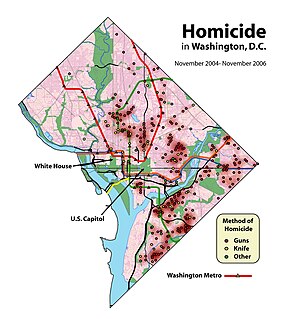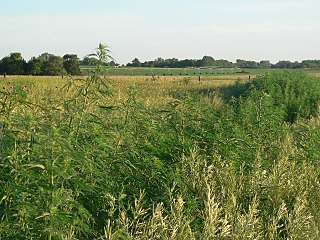
Weed control is the botanical component of pest control, which attempts to stop weeds, especially noxious or injurious weeds, from competing with desired flora and fauna, this includes domesticated plants and livestock, and in natural settings, it includes stopping non local species competing with native, local, species, especially so in reserves and heritage areas.

Ajwain, ajowan, or Trachyspermum ammi—also known as ajowan caraway, bishop's weed, or carom—is an annual herb in the family Apiaceae. Both the leaves and the seed‑like fruit of the plant are consumed by humans. The name "bishop's weed" also is a common name for other plants. The "seed" is often confused with lovage "seed".

Crime mapping is used by analysts in law enforcement agencies to map, visualize, and analyze crime incident patterns. It is a key component of crime analysis and the CompStat policing strategy. Mapping crime, using Geographic Information Systems (GIS), allows crime analysts to identify crime hot spots, along with other trends and patterns.

Agrostemma is a genus of annual plants in the Caryophyllaceae family, containing the species known as corncockles. Its best-known member is A. githago, the common corncockle, which is a native of Europe where it is simply called "the corncockle". The species is a weed of cereals and other crops, probably with a centre of origin in the eastern Mediterranean. Nowadays declining in its native range because of improved seed cleaning, it is found as a weed worldwide. Agrostemma gracile, the slender corncockle, is only found in central Greece near the city of Farsala. Corncockle is an attractive plant, and its seeds are still commercially available to gardeners.

Cirsium arvense is a perennial species of flowering plant in the family Asteraceae, native throughout Europe and northern Asia, and widely introduced elsewhere. The standard English name in its native area is creeping thistle.

A tumbleweed is a structural part of the above-ground anatomy of a number of species of plants, a diaspore that, once it is mature and dry, detaches from its root or stem, and tumbles away in the wind. In most such species, the tumbleweed is in effect the entire plant apart from the root system, but in other plants, a hollow fruit or an inflorescence might serve the function. Tumbleweed species occur most commonly in steppe and arid ecosystems, where frequent wind and the open environment permit rolling without prohibitive obstruction.

Feral cannabis, or wild marijuana, is wild-growing cannabis generally descended from industrial hemp plants previously cultivated for fiber, with low or negligible amounts of psychoactive tetrahydrocannabinol (THC).

Haughville is a working-class neighborhood west of downtown Indianapolis. Its borders are roughly White River Parkway to the east, Tibbs Avenue to the west, 10th Street to the north, and Michigan Street to the south. It was first settled in the 1830s and grew after a bridge was built connecting to Indianapolis, which annexed the town in 1897. Population then included Slovenian, German and Irish immigrants, among other European immigrants. In the 21st century, the neighborhood suffers from a high crime rate and low property values. It is considered one of the most impoverished neighborhoods in the city.

The 2006 NCAA Division I Men's Basketball Tournament involved 65 teams playing in a single-elimination tournament to determine the national champion of men's NCAA Division I college basketball as a culmination of the 2005–06 basketball season. It began on March 14, 2006, and concluded on April 3 at the RCA Dome in Indianapolis, Indiana.
The 1980 NCAA Division I Basketball Tournament involved 48 schools playing in single-elimination play to determine the national champion of men's NCAA Division I college basketball. It began on March 6th, 1980, and ended with the championship game on March 24th at Market Square Arena in Indianapolis. A total of 48 games were played, including a national 3rd place game.

The 1997 NCAA Division I Men's Basketball Tournament involved 64 schools playing in single-elimination play to determine the national champion of men's NCAA Division I college basketball. It began on March 13, 1997, and ended with the championship game on March 31 in Indianapolis, Indiana at the RCA Dome. A total of 63 games were played.

The 2000 NCAA Division I Men's Basketball Tournament involved 64 schools playing in single-elimination play to determine the national champion of men's NCAA Division I college basketball. It began on March 16, 2000, and ended with the championship game on April 3 in Indianapolis, Indiana at the RCA Dome. A total of 63 games were played.

Vavilovian mimicry is a form of mimicry in plants where a weed comes to share one or more characteristics with a domesticated plant through generations of artificial selection. It is named after Nikolai Vavilov, a prominent Russian plant geneticist. Selection against the weed may occur by killing a young or adult weed, separating its seeds from those of the crop (winnowing), or both. This has been done manually since Neolithic times, and in more recent years by agricultural machinery.
Dow AgroSciences LLC is a wholly owned subsidiary of the Dow Chemical Company specializing in not only agricultural chemicals such as pesticides, but also seeds and biotechnology solutions. The company is based in Indianapolis, Indiana, in the United States. On 31 January 2006, Dow AgroSciences announced that it had received regulatory approval for the world's first plant-cell-produced vaccine against Newcastle disease virus from USDA Center for Veterinary Biologics. Dow AgroSciences operates brand names such as Sentricon, Vikane, Mycogen®, SmartStax®, Enlist™, Pfister Seed®, PhytoGen®, Prairie Brand Seed®, Alforex Seeds®, Profume, Dairyland Seed®, and Brodbeck Seed®.

A noxious weed, harmful weed or injurious weed is a weed that has been designated by an agricultural authority as one that is injurious to agricultural or horticultural crops, natural habitats or ecosystems, or humans or livestock. Most noxious weeds have been introduced into an ecosystem by ignorance, mismanagement, or accident. Some noxious weeds are native. Typically they are plants that grow aggressively, multiply quickly without natural controls, and display adverse effects through contact or ingestion. Noxious weeds are a large problem in many parts of the world, greatly affecting areas of agriculture, forest management, nature reserves, parks and other open space.
The 1995 Indianapolis Colts season was the 43rd season for the team in the National Football League and 12th in Indianapolis. The Indianapolis Colts finished the National Football League's 1995 season with a record of 9 wins and 7 losses, and finished tied for second in the AFC East division with the Miami Dolphins. However, the Colts finished ahead of Miami based on head-to-head sweep (2–0).
A weed is a plant considered undesirable in a particular situation, "a plant in the wrong place". Examples commonly are plants unwanted in human-controlled settings, such as farm fields, gardens, lawns, and parks. Taxonomically, the term "weed" has no botanical significance, because a plant that is a weed in one context is not a weed when growing in a situation where it is in fact wanted, and where one species of plant is a valuable crop plant, another species in the same genus might be a serious weed, such as a wild bramble growing among cultivated loganberries. In the same way, volunteer crops (plants) are regarded as weeds in a subsequent crop. Many plants that people widely regard as weeds also are intentionally grown in gardens and other cultivated settings, in which case they are sometimes called beneficial weeds. The term weed also is applied to any plant that grows or reproduces aggressively, or is invasive outside its native habitat. More broadly "weed" occasionally is applied pejoratively to species outside the plant kingdom, species that can survive in diverse environments and reproduce quickly; in this sense it has even been applied to humans.

The 2015 NCAA Division I Men's Basketball Tournament involved 68 teams playing in a single-elimination tournament to determine the national champion of men's NCAA Division I college basketball. The 77th edition of the tournament began on March 17, 2015, and concluded with the championship game on April 6 at Lucas Oil Stadium in Indianapolis. Duke defeated Wisconsin in the championship game, 68–63. Tyus Jones of Duke was the tournament's Most Outstanding Player.

Jimson Weed is an oil on linen painting by American artist Georgia O'Keeffe from 1936, located in the Indianapolis Museum of Art, which is in Indianapolis, Indiana, United States. It depicts four large blossoms of jimson weed. A similar work by O'Keeffe, Jimson Weed/White Flower No. 1, was sold by the Georgia O'Keeffe Museum at auction to Walmart heiress Alice Walton in 2014 for $44,405,000, more than tripling the previous world record for auction price of a piece by a female artist.















